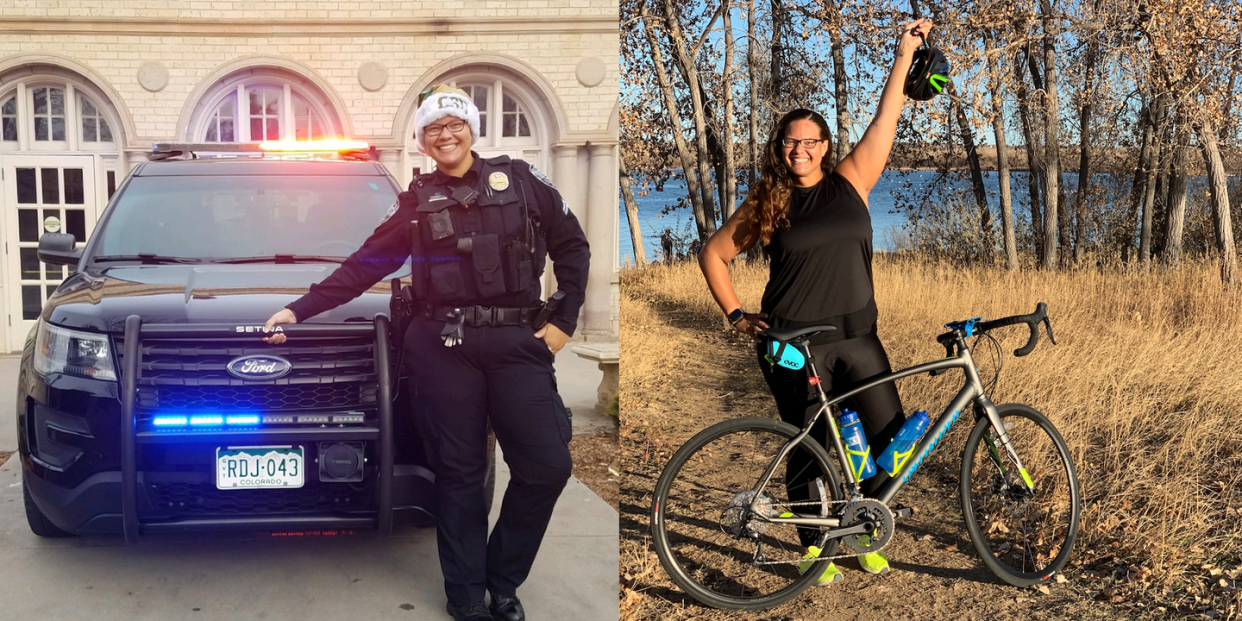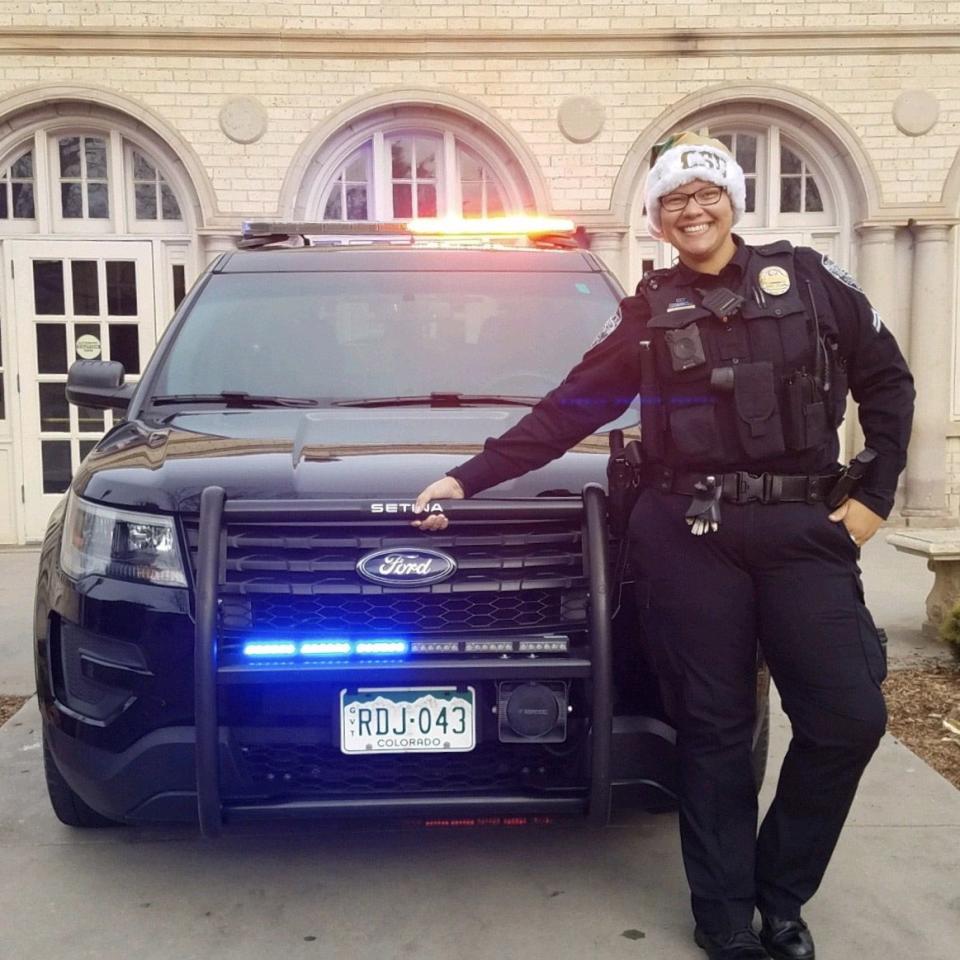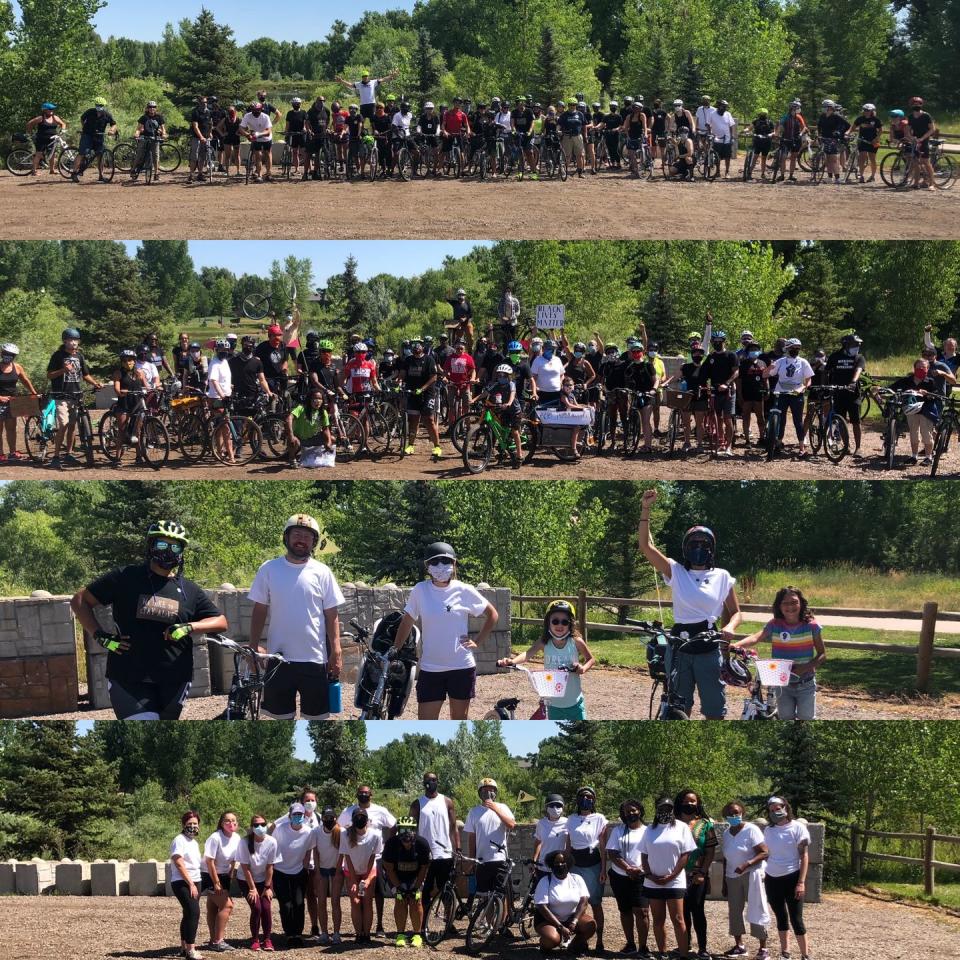This Black Police Officer Rode 400 Miles to Fight for Racial Justice

For the month of July, Alisha Zellner’s weekend rides were meditations in motion.
Before the sun began broiling over Fort Collins, Colorado, the 33-year-old would hop on her bike and cruise through one of the many luscious green trails in her city. Oftentimes she was by herself with only the white noise of whirring wheels—her mind a blank page as she watched the foothills rolling in the distance. Other times, current events flooded her brain: the national outcry against racial injustice, mixed with her experiences as a Black woman, as a Colorado State University police officer, and her role in uniting her communities.
One day, Zellner popped in her headphones and listened to Hamilton, the famous Broadway hit that featured BIPOC actors playing the Founding Fathers. She reflected on what it really meant to foster freedom for all—as these rides were not about leisure for Zellner. To quote the musical, cycling was “not a moment” ... “it’s the movement” she chose to join part of the larger #BlackLivesMatter conversations happening all over the country.
After George Floyd was killed by police in May, Zellner she pledged to ride 400 miles (about 12.9 miles a day) throughout the month of July to bring awareness to the 400-plus years the Black community has been fighting for their civil rights. Her initial goal was to raise $2,500 for organizations aiming to end police brutality and preserve Black history, such as Black Lives Matter, the NAACP Legal Defense Fund, and the National Museum of African American History and Culture.
She called the initiative Bike Ride for Black Lives.
“I started with hopes that it would become something this big, but I didn't know if it would would take off,” Zellner told Prevention.

Luckily, what started as solo outdoor rides and indoor spin sessions with her girls became a city-wide phenomenon. Word quickly spread through the Fort Collins local press, and more people asked to join Zellner.
“We would do 10 miles or so, just around parks or within the community and have some of those tougher conversations on race,” said Zellner. They’d ask one another: What social impact did you have today besides just having a conversation? What books are you reading? What are you teaching yourself that you didn't necessarily learn in school?
When Zellner got the idea to organize a larger community awareness ride on July 12, she thought 30 people would come.
“We had roughly 200 people show up,” she said. “It was unbelievable to see. We had literally all the generations, all different kinds of races. But the most magical part was when other officers of color came up to me and said, 'Thank you for creating a space for us to have a voice in the movement at a time when those of us in uniform have to remain neutral.'”
By week three, the initiative had built momentum, but Zellner’s body was starting to tire.
“I was drained,” she said. “But I knew I was out there riding with a purpose.”
On day 24, in the final push, she challenged herself to bike the Horsetooth Reservoir Dams, a series of monstrous hills that many pro cyclists use to train. It was her first time, and she was afraid. But the moment she reached the top, Zellner completed her 400th mile. Zellner proudly raised her bike overhead in victory, relief, satisfaction.
A post shared by EpicStrong (@epic_strong) on Jul 24, 2020 at 7:14pm PDT
By the end of the final charity spin class at CycleBar, Bike Ride for Black Lives had far exceeded its fundraising goals. Zellner had biked well over 500-miles and her community raised more than $6,800. And she feels as if this initiative is just getting started, not just in terms of its social justice contribution.
It’s a part of a larger movement of Black cyclists connecting across Colorado.
Historically, cycling has not been the most racially diverse sport, making it seem like a health trend that is only meant for a few. One of the reasons, Zellner thinks, is because of the cost.
“I am thankful to have the privilege to own a bike because when we talk about systemic racism, that includes access to things like sports, or being able to buy an affordable bicycle and affordable gear,” she said. “That doesn’t exist for everybody.”
[Want to fly up hills? Climb! gives you the workouts and mental strategies to conquer your nearest peak.]
While the price tag on bikes may discourage many who are underprivileged, there are also many people of color who may not have access to safe bike lanes in their neighborhood or a cycling community where they feel secure and welcome.
For Zellner, this lack of access is frustrating, considering the positive influence that sports like cycling has had on her physical and mental health. She knows that these sports have the power to do the same for others, especially during a global pandemic when safe access to gyms, playgrounds, and other fitness facilities is limited.

As a teenager, she suffered from depression and struggled with her weight. In 2007, Zellner picked up running and changed her diet. She gradually started to feel happier and she lost 110 pounds in a year. She fell in love with cycling when she did her first triathlon in 2014. Today, with all the stresses of COVID-19 and quarantine, she finds biking is one of her main activities to clear her mind and stay healthy. But as much as she appreciates cycling and running, it’s been tough for her to connect with other enthusiasts who look like her.
“Fort Collins is a predominately white city, so it's very rare for me to see people of color in general,” she said. “It can feel really isolating in that respect because I know we [Black cyclists] exist. It’s just that finding community to be able to come together can be the difficult part sometimes.”
But perhaps that feeling of isolation is beginning to shift. There were other Colorado initiatives that brought BIPOC and their allies together this summer. For example, Denver Solidarity Rides has organized multiple bike protests to support the #BlackLivesMatter movement. And in early August, Zellner attended an event hosted by Ride for Racial Justice, a Denver-based organization.
Ride for Racial justice was cofounded by a cyclist Mark Robinson who felt unsafe riding-while-Black after the death of George Floyd. When fellow white cyclist, Neal Henderson, offered to organize a group of riders to join Robinson on his next ride, the two friends felt there was a bigger vision here: creating spaces to ensure that everyone feels empowered to cycle no matter the color of a person’s skin.
“I just was so blown away,” Zellner said of their 150-group ride in Boulder. “I saw so many professional black cyclists—both male and female—show up for this ride. I hope that Ride for Racial Justice and Bike Ride for Black Lives can partner together to bring them up here do another community ride here in Fort Collins in the next couple of months.”
Zellner is now bubbling with ideas on how to expand Bike Ride for Black Lives in her city. Recently, she’s been having conversations with local Black-owned businesses to figure out how this campaign can bring more attention and appreciation for the BIPOC families in Fort Collins.
For now, the spirit of Bike Ride for Black Lives lives on its group Facebook page where people can continue to push these conversations on criminal justice reform and racial inequality as well as connect with like-minds.
“I’m so thankful that it's going to continue rolling on,” said Zellner. “This is me getting an opportunity to honor my Black community—the community I’ve been a part of my entire life. My hope for Bike Rides for Black Lives is that it becomes an annual thing that we do every July so that the community never forgets that we have work that we must continue doing.”
You Might Also Like

